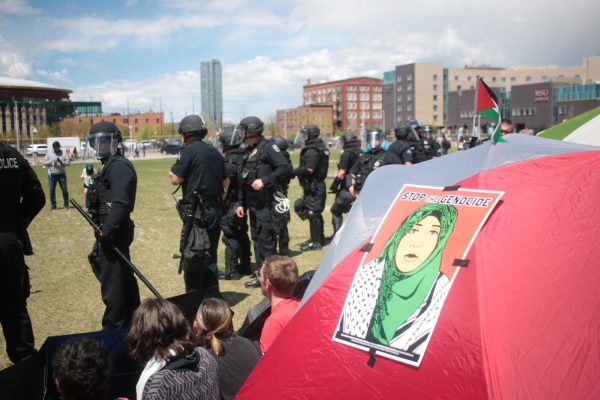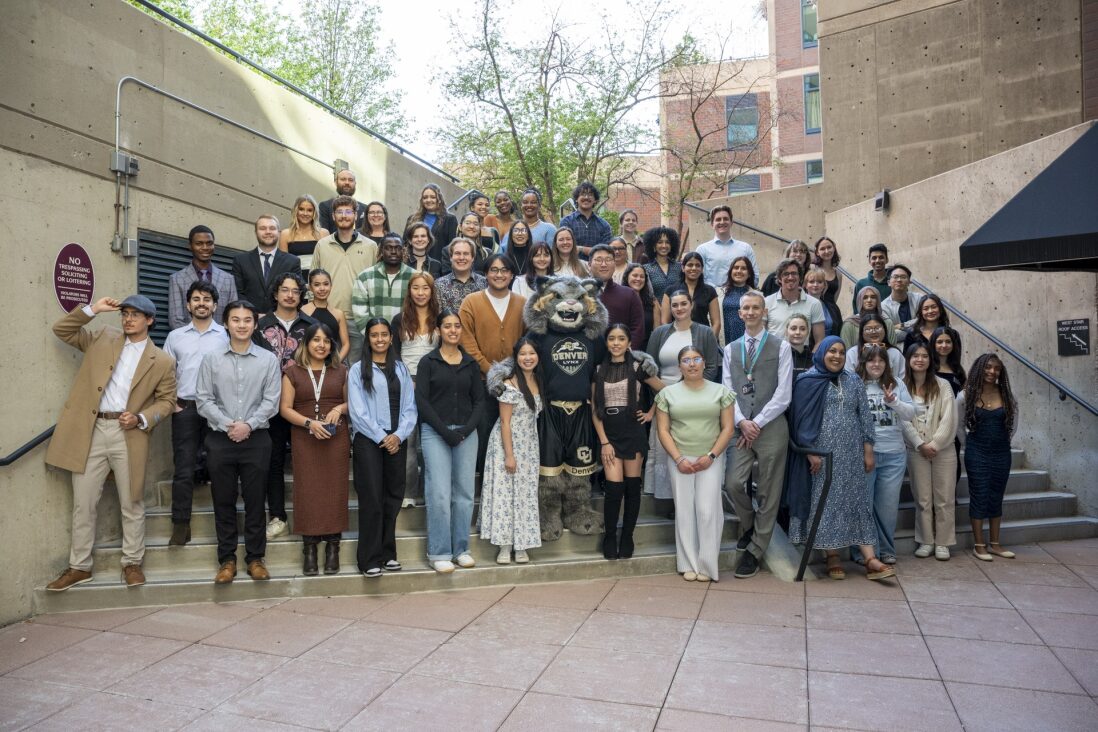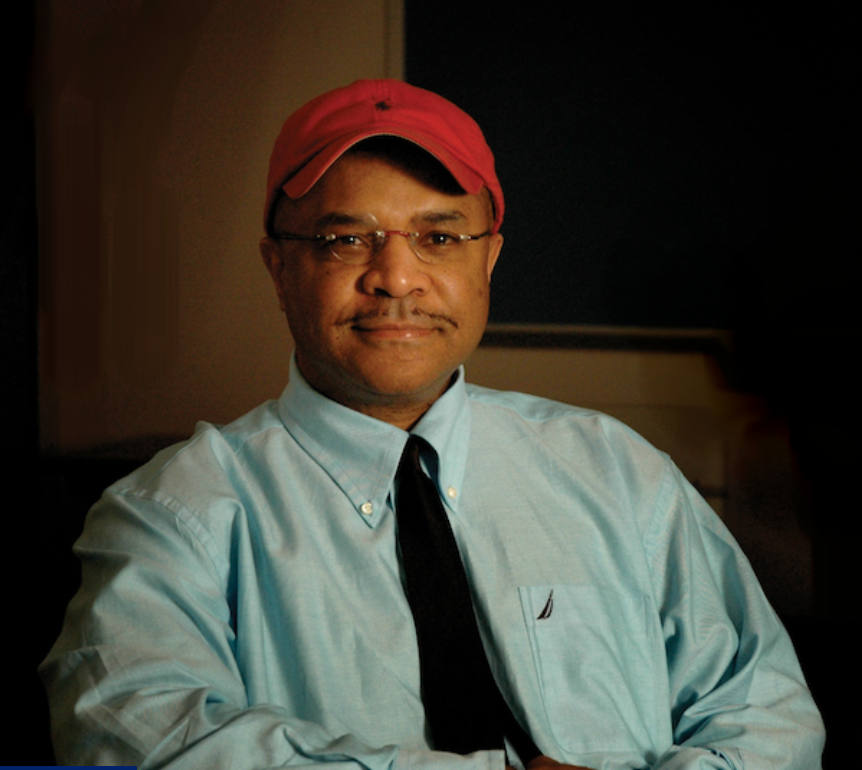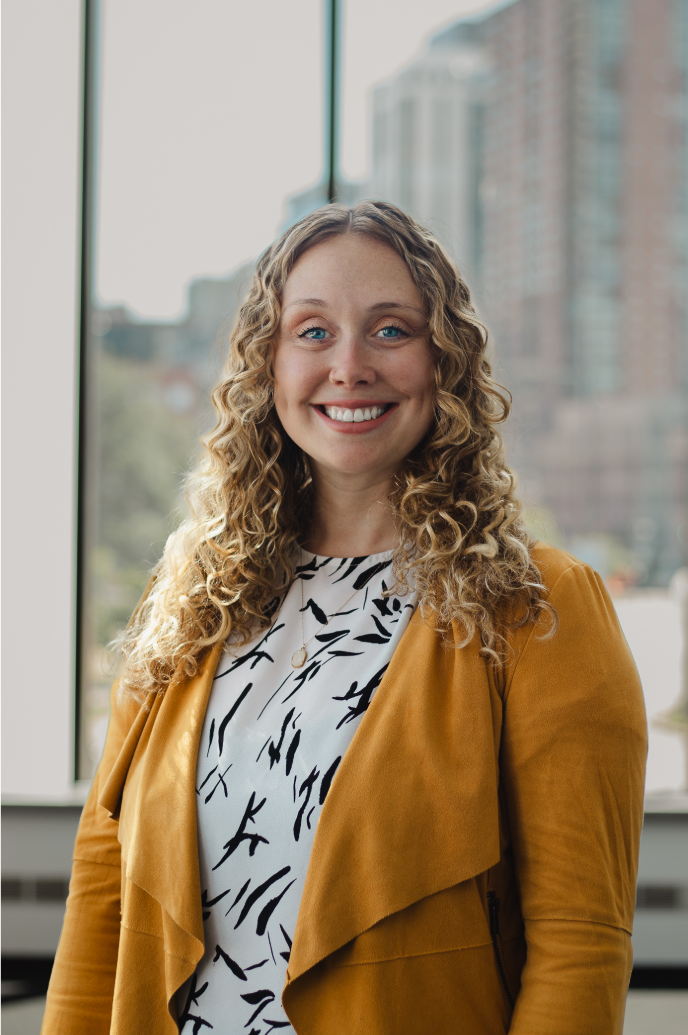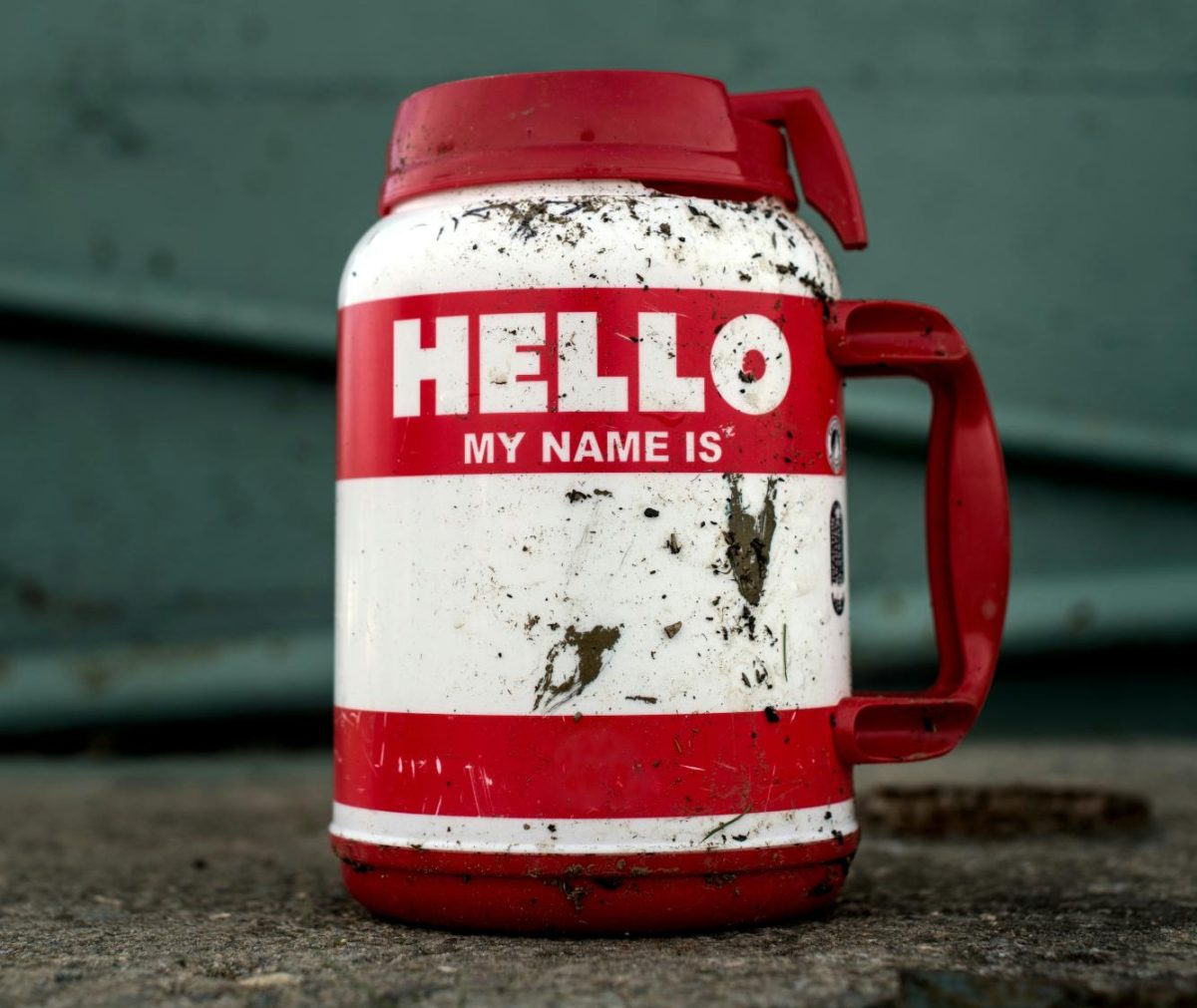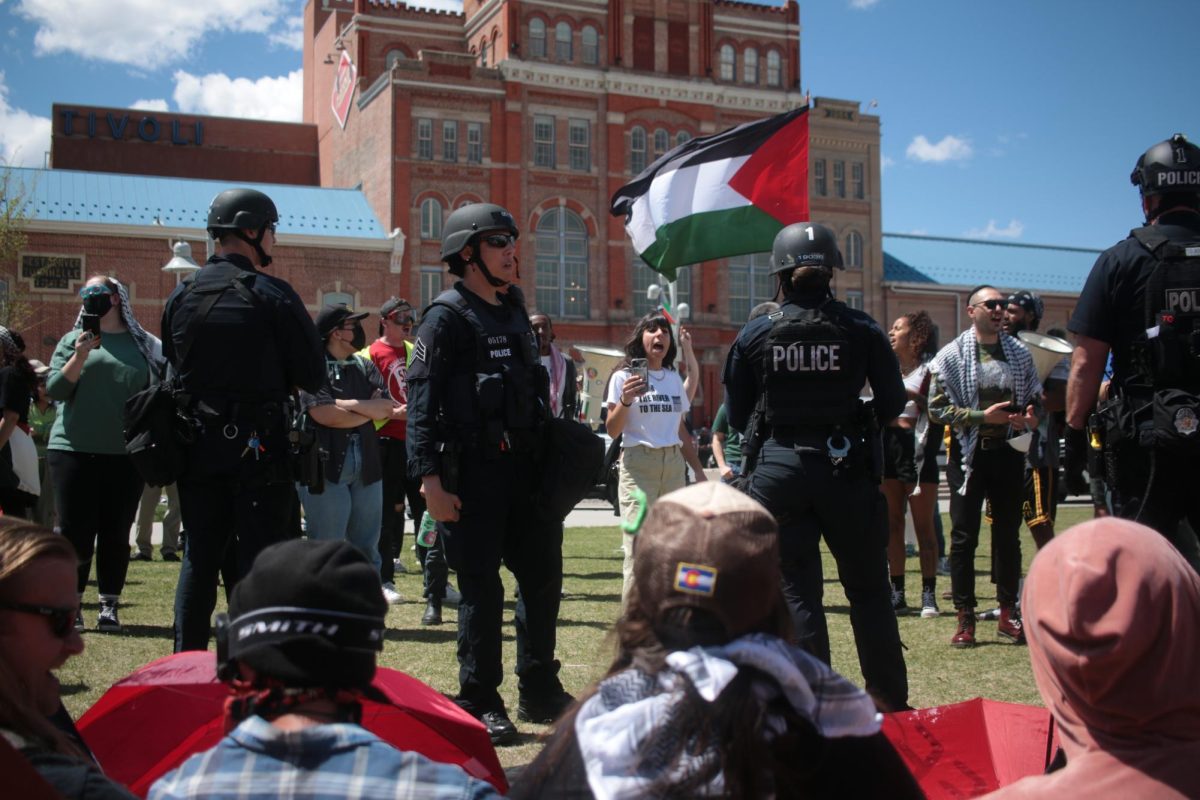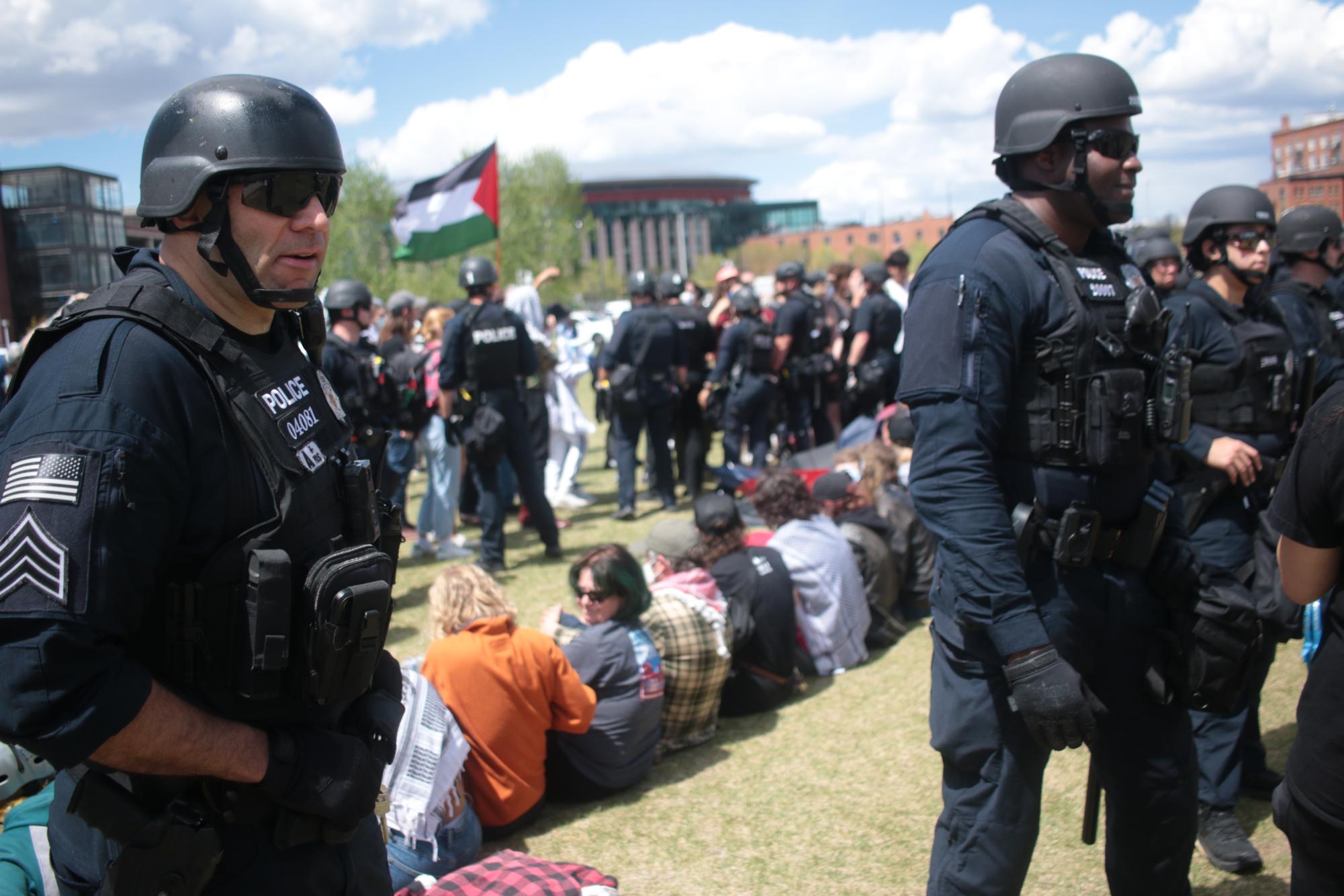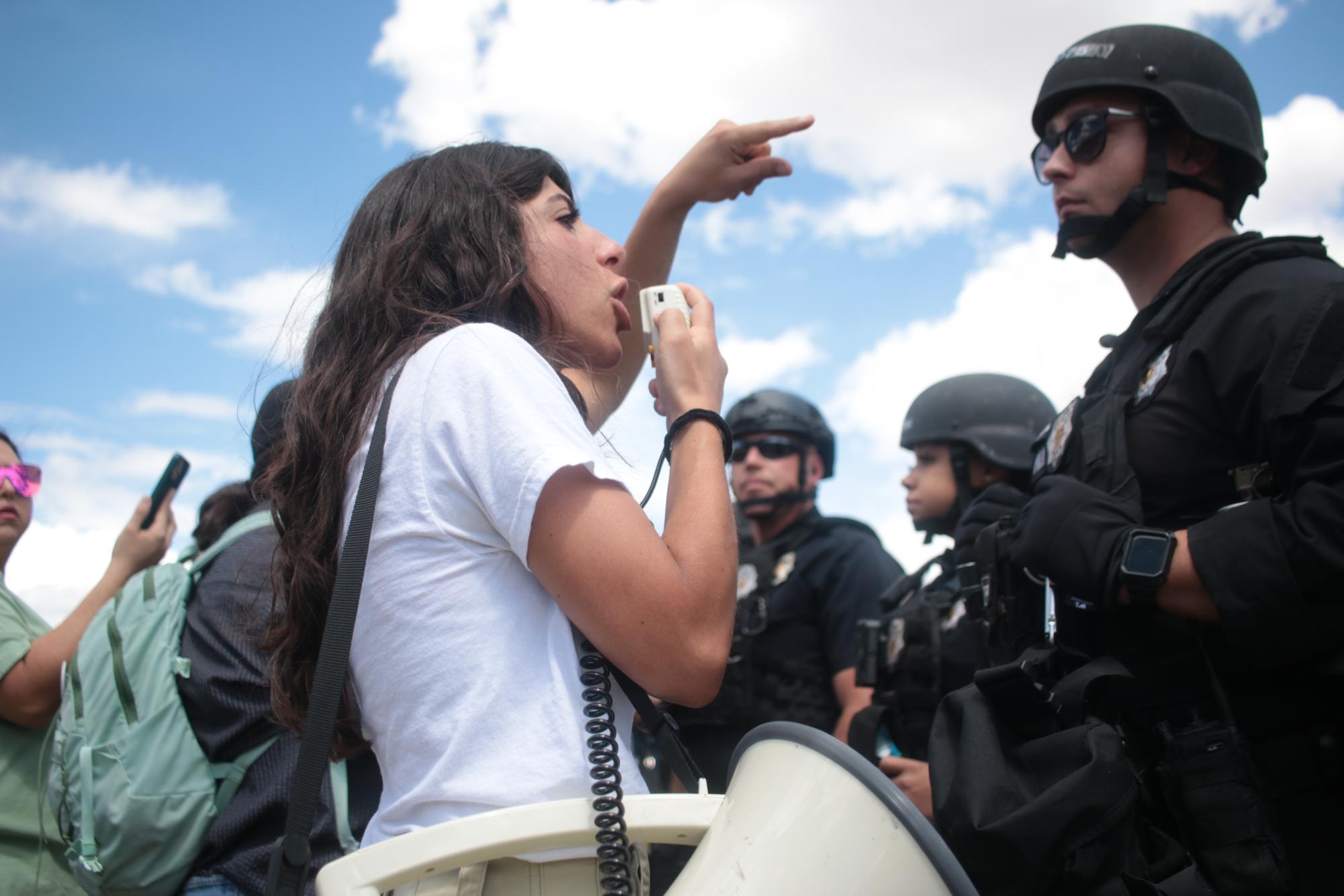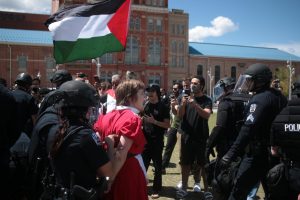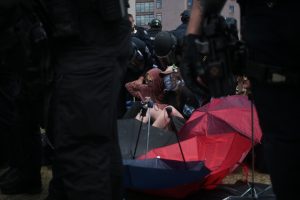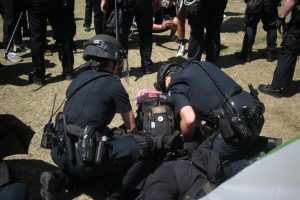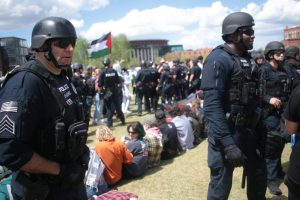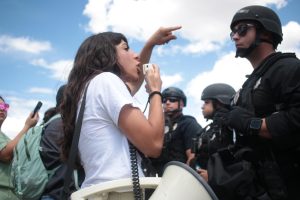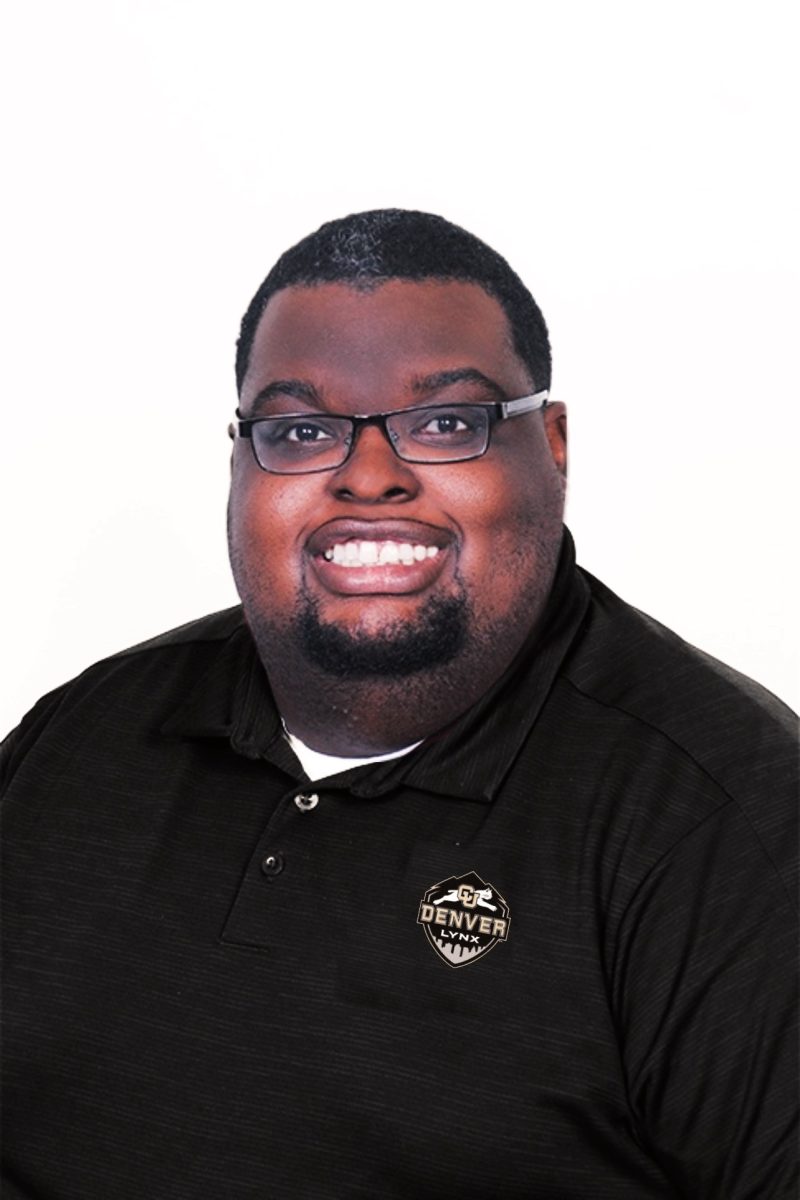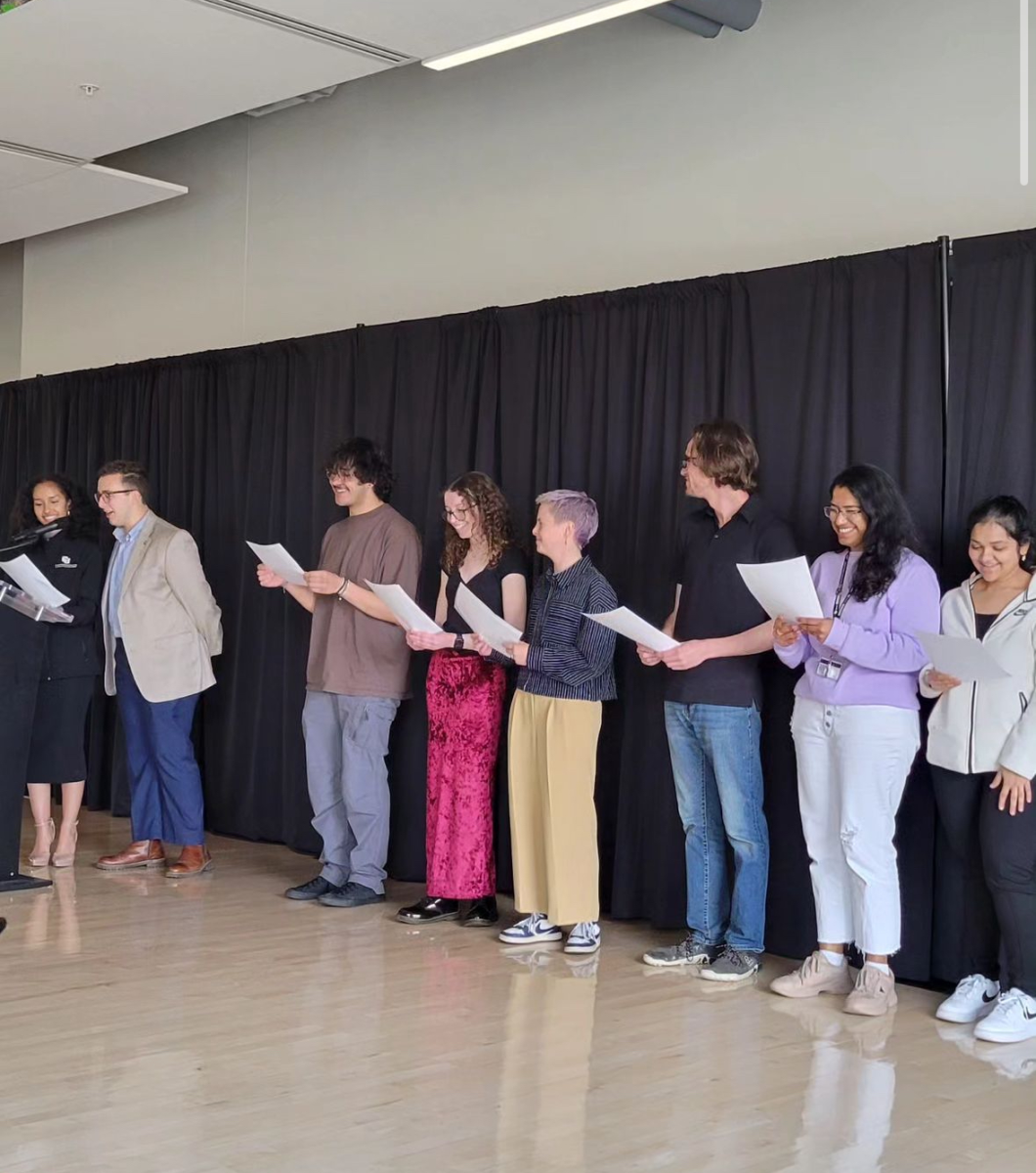On Thursday, April 25, student protesters across the tri-instituional Auraria campus, organized by the Denver chapter of the Students for a Democratic Society (SDS) and the Colorado Palestine Coalation (CPC), gathered on the Tivoli Quad with tents, supplies, signs, and their voices to mark their demands on the CU institutions to end their financial ties to the US Military and government and other entities that operate in Isreal, who are supporting Isreal’s perpetuation of genocide in Palestine.
SDS began setting up their encampment at 12:00p.m. on April 25. Auraria Higher Education Department (AHEC), Auraria Campus Police Department (ACPD), and CU Denver and Metropolitan State University (MSU) administrators were aware of their plan to protest, but not about their plan to set up encampments. SDS’ encampment has joined the string of encampment protests across the country, and solidifies the seriousness and the permanence of their goals: their encampment will remain until their demands are met. SDS’ demands to the CU Institutions include the divestment from corporations that operate in Israel, the refusal of grants or funding from corporations that contract with the US Armed Forces and the termination of these relationships, the end of study abroad programs in Israel, a statement that condemns the genocidal actions of Israel, full transparency of the institution’s financial investments (especially how students’ tuition is being invested), and a meeting with Chancellor Michelle Marks of CU Denver to discuss the implementation of their demands.
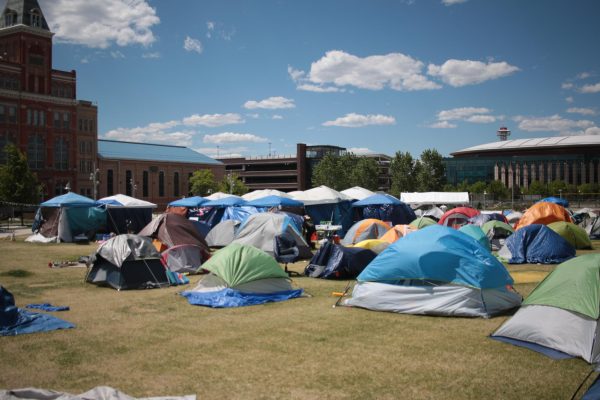
According to members of SDS, by 6:00p.m. that day, AHEC, ACPD, CU Denver and MSU combined with the Denver Police Department (DPD), warned student protesters that they would be arrested and charged with trespassing if they failed to take down their encampment. Minutes before the ACPD and DPD were prepared to start making arrests, the leaders of SDS met with Angie Paccione, the Executive Director of the Colorado Department of Higher Education, Colleen Walker, the CEO of AHEC, and Genia Herndon, Associate Vice Chancellor for Student Affairs, in the Tivoli, where they discussed their refusal to meet SDS’s demands and threatened them with the consequence of arrests. After this meeting, law enforcement retreated for the night, and after successfully camping out all night on Thursday, SDS and the student protesters woke up to a new challenge from AHEC, the ACPD, and the DPD.
On Friday at 11:33a.m., Chancellor Marks sent a message to all students and faculty at CU Denver, with the subject line, “Updates on campus demonstration.” Among other words, she wrote: “I want to emphasize that we always have and will continue to respect our community’s right to exercise free speech. We must also prioritize safety and adhere to our campus policy prohibiting camping… We are also collaborating with a variety of campus, local, and state partners to ensure the safety and well-being of everyone on campus.”
These “collaborations” with “campus, local, and state partners” included the collaboration between AHEC, the DPD, and ACPD, who were motioned on Friday morning to start a string of arrests against the student protesters.
Following Marks’ update, a series of alerts were sent to students and faculty of the entire Auraria campus. Starting at 12:31p.m., students and faculty received a message that read, “Auraria Emergency Alert: Due to civil unrest, please avoid the Tivoli Quad.” At 12:58p.m., another message read, “Auraria Emergency Alert: All inbound traffic to the Auraria Campus is closed.” Law enforcement surrounded the Auraria campus, blocking all incoming traffic from entering. Multiple student events were also canceled in response to the protest and the presence of DPD on campus.
During the times these messages were sent, the DPD had already swarmed the Auraria campus, along with a prison bus that was camped in front of the Tivoli Quad. Police officers, equipped in expensive riot gear and some even carrying pepper ball guns, entered the Tivoli Quad at much higher volumes than they had been prepared to do the day before. The DPD positioned themselves in a circle surrounding students sitting near the encampment and were encircled by standing protesters, all linking arms and chanting their original message of “Free Palestine.” Included in the chain of standing protesters were CU Denver Professors Tony Robinson, Jim Walsh, Bassem Hassan, and Keith Guzik.
Members of the DPD began arresting the students sitting near the encampment, either asking them to leave and then guiding them to the prison bus, or if the students refused to leave, they would be forcefully dragged off. The standing protesters began forming masses around the police line in an effort to prevent arrests. One protester was forcibly shoved out of the way by members of the DPD, who then proceeded to lock him in handcuffs and join the other students in the prison bus. An anonymous bystander reported that they saw a police car’s side mirror hit the shoulder of a protester on their way off of the campus, and the impact was so hard that it collapsed the mirror in.
Bystanders also witnessed Black student protesters who were visibly uneasy by the increase in police force on campus, many of them either leaving the protest or putting their hands in the air. An anonymous student of color commented that the police presence on campus was reminiscent of the brutality of police force during the Black Lives Matter protests in downtown Denver in 2020.
Amongst this increasing chaos, another student, who was rumored to have been part of the protest’s organization, began running away from the DPD forces and was chased by police officers on motorcycles until they surrounded her and her peer. The student was immediately put into handcuffs and taken to the prison bus, while her peer was forcibly held to the ground, the knee of a police officer holding him in place while he stru
ggled against the constraint. Students gathered around this incident in shock and terror, screaming at the police forces to leave the campus and leave the students alone.
“A lot of this brutality is unnecessary. They say they are bringing order, but they are the unrest,” said Hatem Teirelbar, one of the core members of Denver’s SDS chapter.
Another anonymous student who was witness to the unfolding aggression by police forces on the Tivoli Quad commented that, “It was so dystopian being at an event that was awarding students for their research at an equity serving institution and watching students being arrested right outside the window, just because they were protesting to achieve equality and justice.” The student was participating in RACAS, the Research and Creative Activities Symposium, earlier that day.
The peak of this police force against student protesters on Friday afternoon indicates a fine line between the protections of the First Amendment allotted to students versus the constraints placed upon them by the manner and setting in which they act on their First Amendment rights. In a statement released by Chancellor Marks on Friday at 9:56p.m., “On-campus camping is a violation of Auraria Higher Education Center (AHEC) policy that poses health, safety, and security concerns for both the demonstrators and those who provide support and assistance. Protesters were provided written copies of AHEC’s camping policy and additional guidance and clarification yesterday and today. Throughout the semester and in the past two days, students have never been asked to stop protesting.”
AHEC owns the land that the Auraria campus is positioned on, but they rent out individual parts of the land to the three institutions that constitute the Auraria campus: CU Denver, MSU, and the Community College of Denver (CCD). This means that AHEC is the governing body of areas of the campus that are not designated to one of the three colleges, like the Tivoli and the Tivoli Quad. According to AHEC’s camping policy, “campus shall not be used for camping, regardless of the duration or purpose.” This policy has been put in place since 2004, and was instituted after another encampment protest demonstrated by students in 2002.
Z Williams, one of the protesters working with SDS, commented on their encampment that was aimed at protesting the war in Iraq. “We held camp in the middle of campus for three weeks. This camp was a fraction of what we see today. It was maybe 10 tents or so,” said Z, “Eventually, Auraria informed us that we needed to move and the camp would be cleared because of an upcoming festival. We were so exhausted at this point. We had been organizing nonstop and we couldn’t keep it up plus keep organizing marches, rallies, and other events. During the [following] academic year, AHEC passed the policy being enforced against students now.”
Under AHEC’s camping policy, the arrests of the students who took part in organizing and constructing the encampment were justified. AHEC’s jurisdiction over the campus privatizes the rights of students because they must be in compliance with their policy. But how does the strength of AHEC’s policy compare to the strength of the students’ Constitutional rights?
“Policy is trumped by Constitutional rights,” said an anonymous student, “… and [the protestors have] been incredibly peaceful so there’s some legality question here with the arrests being made.”
Because these students were camping in an extension of their First Amendment rights to protest and assemble, and were also expressing political speech (which is the highest level of protected speech under federal law), the justification for their arrests is not as clear cut. It is also complicated by the fact that after the first string of arrests, protesters took down the encampments but remained sitting on the Tivoli lawn, yet were still arrested, even though they had no direct correlation to the encampments.
In lieu of the nationwide onslaught of police force against student protests, The American Civil Liberties Union released accessible information to students on their rights to protest. They state that, “public areas of campus like streets, sidewalks, and parks should be treated like ‘traditional public forums,’ meaning restrictions cannot discriminate based on the message being expressed by protesters and must be sufficiently tied to a significant government interest.” They also state that, “public institutions do have the authority to reasonably regulate the time, place, and manner in which demonstrations can take place, as long as they leave ample other avenues for expression.” AHEC restricted the manner in which these demonstrations took place because the demonstrations were against their camping policy and on their private property, and it is implied that they offered the students a different avenue of expression by offering them the right to protest without encampment. However, when considering the arrests of students who were not in correlation with the encampments, AHEC’s justification for the arrests are not as strong because they were arrests of students who were exercising their First Amendment rights to assemble and protest.
The arrest process continued for about two hours, with members of the DPD capturing sitting protesters one by one and were increasingly encircling the demonstrators, whose chants of “Fuck 12,” “Fuck Pigs,” “Keep your hands off our kids,” and “Why are you in riot gear/ I don’t see a riot here” filled the air as the police officers’ presence grew more forcible.
In a reaction to the extremities of the police force against the protesters’ peaceful gathering, an anonymous student commented that, “People are sitting. Outside. In a tent, sipping freaking gatorade. And they’re [DPD] in riot gear… And we’re just a bunch of college students or whatever, but they have a prison van and riot gear. These guys are scared shitless of what we can do.”
According to AHEC’s website, updated last on April 26, “Currently, there have been approximately 40 arrests by Auraria Higher Education Center Police and the Denver Police Department. Detainees are facing trespassing charges per the campus camping policy.”
Following the arrests made on Friday afternoon, Denver Mayor Mike Johnston met with the student protesters at around 7:30p.m. to tell them that they needed to take down their tents or police would start making more arrests. According to the Denver Gazette, Mayor Johnston told students that “We are here to try to make sure we can help you all exercise your right to protest peacefully,” but that because they were interfering with campus operations and policy, their right to protest would be compromised by police force. The protesters argued that because their demands weren’t being met, they would not meet his demands, and kept most of the tents up through the night.
The DPD returned to the Tivoli Quad on Friday at around 6:00p.m., but didn’t make any arrests. An anonymous student detailed that students in the City Heights Dorm building, which rests opposite to the Tivoli Quad, were put on lockdown and told if they left their dorms, they would be threatened with expulsion. In an effort to avoid punishment by the administrations and the DPD, students at City Heights held signs to their dorm windows in support of the student protestors and Palestine.
Also after the arrests made on Friday, a statement was released by Colorado State Representatives, Senators, Denver City councilmembers, and a CU-Regent in support of the student protesters. Those who signed included Assistant Majority Leader Jennifer Bacon, Reps. Meg Froelich, Javier Mabrey, Tim Hernandez, Leslie Herod, Steven Woodrow, Emily Sirota, Alex Valdez, President Pro. Tem. James Coleman, Senator Julie Gonzales, Majority Leader Robert Rodriguez, City Councilmembers At-Large Serena Gonzales-Guiterrez and Sarah Parady, City Councilmember Shontel Lewis, City Councilmember Pro. Tem. Amanda Sandoval, City Councilmember President Jamie Torres, and CU-Regent Wanda James. Addressed to the “Leaders of the Auraria Higher Education Campus, Auraria Campus Police, and the Denver Police Department,” the statement read, among many words of support, that, “We do not find tents a justifiable reason for the Denver Police Department, with the authorization of the Auraria Campus Police, to enact violent arrests of any community member present on the campus…. We call on the leaders of this campus to respect the First Amendment rights of all peaceful protesters and call off any and all police intervention.”
“To me, this is a gross affront to any form of free speech and any form of free protest,” said Keegan, a student at CCD, “We’ve seen what happens when armed forces show up to protest, especially on college campuses. I was just hoping that Auraria would do better than this. I was hoping they would have enough of an understanding that there are many students here, all through different walks of life, and that we deserve better than this as students. And we deserve better for trying to have an opinion in a world that, quite frankly, could care less about what we have to say.”
Some CU Denver Faculty, including Dr. Jim Walsh and Tony Robinson, have released a statement to Chancellor Marks commenting on the unnecessity of violent police force towards a group of peaceful protesters on campus on Friday, April 27. In their statement, they post a series of questions directed at Chancellor Marks over CU administration’s involvement with the decision to call the DPD, if they will be releasing a response about the “heavily militarized police response to a peaceful demonstration on campus,” and clarify why they sent emergency alerts to students and faculty about a “civil unrest” on campus when it was obviously a peaceful protest. These CU Denver Faculty included in their letter that, “We saw many of our own students at this peaceful assembly—students we see daily in our classes and work to teach the virtues of civic engagement, political commitment, and informed speech and thought… The assembly was entirely peaceful. No faculty member observed any dangerous, violent, or unruly behavior at all.” Because of the peaceful nature of the protest that was brutalized by police force, they ask CU Administration that the students who were arrested on Friday do not receive academic discipline or reprisals for their arrests. The MSU Denver Faculty Union (MSFF) has also condemned the mass arrests on campus and has started a petition to ensure that mass student arrests are not made again.
CU Denver student, SDS member, and Sentry writer Harriet Falconetti was among the arrested students from Friday. “The protest was entirely peaceful before the police showed up,” said Falconetti. “We weren’t causing problems for anyone except the administration, so the use of police violence against us was a severe overreaction. As a student journalist, it is outrageous that my own university would suppress a peaceful student movement in this way.” Falconetti also noted that she was proud to have sacrificed for the cause, saying “a CPR reporter I talked to told me that when a journalist is arrested, they call it ‘getting a notch on your belt.’ I’m happy to have my first notch.”
On April 27, the third day of the protest and following the second night of the encampment, renowned civil rights activist, founding member of the Committees of Correspondence for Democracy and Socialism, and former UC Santa Cruz professor Angela Davis, came to the Tivoli Quad to express her support for the student protesters. Her first words, “Free Palestine!” ignited a wave of cheers amongst the remaining protesters, who had spent the past three days battling through rain, snow, and police aggression. Davis, a beacon of light and support for their efforts, continued, telling the crowd that, “First of all, I want you to know how important it is that you are taking this stand at this moment. I want to emphasize what this means for history. If you can imagine this period being narrated in ten, twenty, even fifty years, you will be the historical actors who made it possible, who are a breakthrough in the struggle against zionism.”
On April 29, the fifth day of the encampment, students were encouraged by the remaining protestors to engage in a walk-out and gather on the Tivoli Quad. Multiple members of SDS, and most of whom had been arrested on Friday, spoke on the importance of their protest and how they will not stop until their demands are met. According to Falconetti’s speech, she and the other students who worked on Professor Jim Walsh’s mayoral campaign in the spring of 2023 were supposed to meet with Chancellor Michelle Marks for lunch later that day. The lunch was canceled, not by the students, but by the Chancellor. Falconetti stared straight in the lens of the camera when she directly addressed Chancellor Marks and said, “This town ain’t big enough for the both of us, and we ain’t gonna leave.”
The CU Denver’s Student Government Association (SGA) Senate meeting on April 30 opened their forum to students across the tri-institutional campus to speak their mind about the protests and the use of aggressive police against it. Current Vice President Savannah Brooks and President Elect has stated that students are welcome to share their comments and concerns at the SGA Senate Meeting on Friday May 3, or email [email protected].
Also on Tuesday April 30, members of SDS met with Chancellor Marks, Jeanine Davidson, and Colleen Walker to discuss their ongoing encampment and their demands of the CU Administration. In her statement released to students and faculty of CU Denver, Chancellor Marks expressed that SDS’ demands fall under the jurisdiction of the CU Board of Regents and the President of the CU institutions. Among other words, Chancellor Marks wrote that, “SDS leaders indicated that they are purposefully engaging in civil disobedience. They recognize that they are in violation of the campus no-camping policy and have no intention of removing the tents until their demands are met. The Auraria Campus executive leaders asked SDS representatives to continue the dialogue to come up with creative ways to move forward.” She continued to express that, “The Auraria executive leaders have continued to support free speech and peaceful assembly,” and that the problem of SDS’ action is that they are violating AHEC’s camping policy.
The protests on the Auraria campus are in lieu with a string of student protests across the country, all demanding that their institutions stop contributing to Israeli forces that are perpetrating the genocide in Palestine. Hundreds of students have been violently arrested because of their encampment protests at college campuses such as Columbia University, Barnard University, Arizona State University, Emory University, George Washington University, Ohio State University, University of North Carolina at Chapel Hill, University of Southern California, University of Texas at Austin, Virginia Tech, and Yale University.
These contemporary protests are reminiscent of the student protests that marked the Vietnam War era in the 1970s, where students at college campuses across the country exercised their right to free speech and protest with constant and aggressive backlash by law enforcement and school administrators. With these demonstrations came great student sacrifices for global peace, humanity, and justice.
An anonymous student commented on the necessity of student action at times like these, arguing that, “This is what we’re here to do as college students, as an educated and aware group of people. This is literally our purpose to draw attention to these issues and to be on the front lines of these fights where we can be, and so it makes perfect sense that it’s a bunch of college students who are out here protesting like this because when you have a certain education level and you’ve been exposed to the world to a certain degree, you start to realize that a lot of things are bullshit and you want to do something about it because an education is supposed to be the tool you use to change the world.”
By the time this article is published, it will be day seven of the encampment. Students at the tri-institutions of the Auraria campus are transforming the history of the Tivoli Quad. The reaction of this peaceful protest will go down in history and mark the Tivoli Quad for decades, even centuries to come, as a place where students sacrificed their rights and their wellbeing for the end of US direct participation in funding Israel’s genocidal actions against Palelstine. In these coming weeks, it will be crucial for student rights across the country to witness the treatment of the Auraria student protesters and will signify a new generation of student protest in a time of great political and social unrest.
